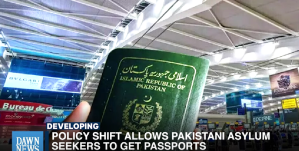
Pakistani Christians who have fled the country due to persecution were relieved to hear the government has reversed its decision to stop issuing or renewing passports to those seeking asylum abroad.
The government announced the decision this week following Interior Minister Mohsin Naqvi’s June 5 statement that the ministry had directed Pakistani diplomatic missions abroad to stop issuing or renewing passports to citizens who have obtained or are seeking asylum, saying it was “in the best national interest.”
The decision to stop issuing passports had caused concern among those fleeing religious and political persecution, with many citizens claiming violation of their basic human rights by denying birth-right to the nationality of their home country.
Pakistan Foreign Minister Ishaq Dar on Monday (July 22) announced that the government had decided to resume issuing passports to asylum-seeking Pakistani citizens who live abroad but whose passports were either canceled or had expired. He said that the passports would be issued within 60 days of application.
Ejaz Alam Augustine, a Christian lawmaker in the Punjab Provincial Assembly, said the government’s June 5 decision had caused immense concern among Christian asylum seekers from Pakistan.
“It’s a good thing that the government has reversed its decision,” Augustine told Christian Daily International-Morning Star News. “It should now focus on ensuring protection and security of the minority communities by addressing the genuine concerns of the people regarding the abuse of the blasphemy laws, which is a major cause of fear and forces people to think about leaving Pakistan.”
Samson Salamat, chairman of the Rawadari Tehreek (Movement for Equality), said that the ban on passports for asylum seekers violated the Universal Declaration of Human Rights, which states that everyone has the right to seek and enjoy asylum from persecution in other countries.
“We are glad that the international community and human rights organizations raised this issue, compelling the Pakistani government to review this illogical decision,” Salamat said.
A Pakistani Christian asylum seeker in the United States said Pakistan’s June 5 decision had caused alarm among those seeking asylum.
“A majority of Christian asylum seekers, including myself, escaped from Pakistan because our lives were threatened by extremist Muslims,” he told Christian Daily International-Morning Star News on condition of anonymity. “My wife and children are still in hiding in Pakistan waiting to be reunited with me after I obtain the refugee status. I was very fearful for their security when reports surfaced that the government would summon the record of all those seeking asylum to cancel their passports, but I’m much relieved now that the ban has been reversed.”
Bishop Azad Marshall, president of the Church of Pakistan, said the policy to ban passports was wrong from the outset.
“The church was opposed to the decision, and we had conveyed our concerns in this regard to the government quarters,” said Marshall, who is also head of the National Council of Churches in Pakistan. “Pakistanis, regardless of their faith affiliations, flee to other countries when they feel insecure or are persecuted. The government’s move would have made such people homeless and stateless.”
Marshall said hundreds of persecuted Christian families from Pakistan have been stranded in Thailand, Malaysia, Sri Lanka and other countries for years hoping to be relocated as refugees to the West.
“The resettlement process for such families or individuals is very slow, and many Christians have returned to Pakistan after failing to make it through,” he said. “If the government had decided to stick to its policy, it would have landed such Christians in a very difficult situation in those countries.”
According to the U.N. High Commissioner for Refugees office in Sri Lanka, the country hosts 311 Pakistani refugees and 180 asylum seekers, including 30 Christians. About 400 Christian families are in Thailand seeking asylum, with a similar number in Malaysia, according to various sources.
For the fifth consecutive year, the Pakistani passport has been ranked the fourth worst, with visa-free access to only 34 out of 227 destinations, according to the latest Henley Passport Index, which ranks the world’s 199 passports.
International rights groups have routinely slammed Pakistan for failing to ensure religious freedom and protect minorities from attacks from Islamic hardliners.
Pakistan ranked seventh on Open Doors’ 2024 World Watch List of the most difficult places to be a Christian, as it was the previous year.




